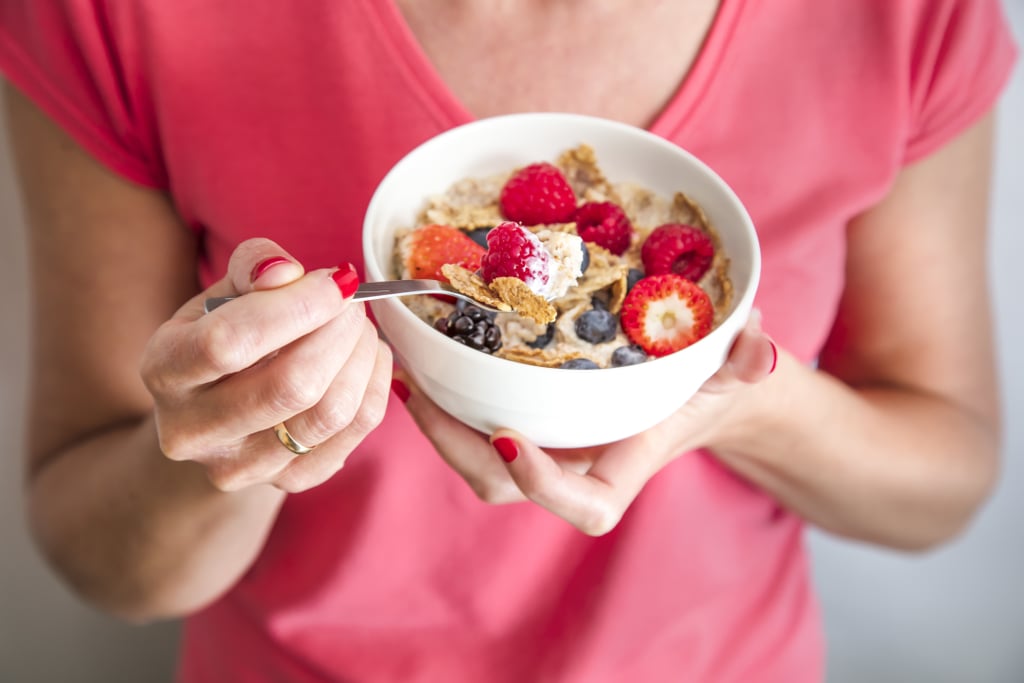So you're ready to start losing weight: you're committed to changing your lifestyle, eating cleaner [1], hitting the gym, adopting healthier habits [2], and getting enough sleep. But where do you go from here?
Starting a weight-loss journey [3] can be particularly overwhelming, especially if you're not sure where to begin. Luckily, we tapped our experts: personal trainers, registered dietitians, and other weight-loss gurus who explain the basics of weight loss. Although it seems complicated, losing weight boils down to these six things. Incorporate them into your life and watch the pounds start to melt off.
Eat in a Healthy Calorie Deficit

Ultimately, losing weight is all about calories in, calories out. In order to lose weight, you have to burn more calories than you take in. "You have to create a deficit of 3,500 calories to lose one pound [4]," dietitian and personal trainer Jim White, RDN, ACSM, owner of Jim White Fitness and Nutrition Studios [5], explained. "This can be done by burning extra calories through exercise or reducing your intake of calories, but the best way is to use a combination of both methods. This ensures that you're giving your body enough nutrients during periods of weight loss."
However, eating in a 3,500-calorie deficit doesn't guarantee an exact weight loss of one pound. There are a lot of other factors that impact how your body loses weight, including stress, sleep, and hormones.
Although you should eat in a calorie deficit, he doesn't recommend anyone eat fewer than 1,200 calories a day. And since calorie needs are highly individual from person to person, Jim recommends meeting with a registered dietitian if you can to assess your needs and your goals. If that's not a possibility, you can use this formula [6] to calculate your ideal calorie deficit for weight loss.
Eat Nutrient-Dense Foods, Including Enough Protein

It's not just the quantity of calories you take in, but also the quality. Jim explained that not all food is created equal. "Especially when restricting calories, it's important to choose foods that are packed with nutrients," he said. He recommends following the MyPlate guidelines [7] for incorporating each food group at every meal:
- Fruits and vegetables: Fill half of your plate with different colours and varieties of produce.
- Protein: Choose lean options like chicken, fish, and legumes.
- Starch: Choose whole grains like brown rice or whole wheat bread.
- Dairy: Include one serving of low-fat or skim milk, cheese, and yoghurt.
To make sure you stay satiated at each meal and build muscle, it's important to eat enough protein. Jim said the standard protein intake is approximately 0.8 grams of protein per kilograms of bodyweight. So if you weigh 150 pounds, which is about 68 kilograms, you should eat about 54.4 grams of protein a day. Registered dietitian Leslie Langevin, MS, of Whole Health Nutrition [8] says to aim for no more than 20 to 30 grams of protein at each meal. But since everyone's weight and activity level matter, this handy chart should help you determine exactly how much protein you need in a day [9].
Aim For 5 Hours of Cardio a Week

"For weight loss, cardio is king," Jim said, adding that the American College of Sports Medicine (ACSM) recommends 300 minutes of cardio training a week [10] for weight loss. "I would recommend low to moderate continuous exercise," he said.
If 300 minutes (five hours) sounds like a lot, it doesn't have to equal vigorous HIIT training [11] or an intense cycling class. Your cardio workout should be at least continuous cardio at a moderate level reaching 60 to 70 percent of your max heart rate.
You can also break it up throughout the week; instead of an hour at a time, maybe you go for a walk for 30 minutes [12] in the morning and ride your bike for 30 minutes in the evening.
Incorporate Strength Training, Too

Cardio is essential for weight loss, but you shouldn't ignore strength training, either. Not only does lifting weights burn calories in and of itself, but building lean muscle will help you burn more calories at rest [13]. "I would recommend two days of strength training a week of track your progress [14] using other methods such as measurements, how your clothes fit, and before and after photos [15].
Get Enough Sleep

You know that when you don't get enough sleep, you're probably tired, cranky, and more likely to give in to your unhealthy food cravings. But did you know that a lack of sleep can also affect your waistline and overall health?
A 2014 study conducted by the Centres for Disease Prevention and Control found that adults between the ages of 18 and 60 who get less than seven hours of sleep per night [16] are at a higher risk of being obese, contracting diabetes, and being under mental distress. According to the National Sleep Foundation, people aged 18 to 64 need between seven and nine hours of sleep per night [17].
How to Keep It Off

Losing weight is just half the battle — keeping it off is the hardest part. Knowing that it still takes a constant effort to maintain weight loss, you can arm yourself with the right tools to keep the weight off for good [18]. Eduardo Grunvald, MD, program director at UC San Diego's Weight Management Program, said the most important factor is to have a positive environment and ongoing support system, whether that's a weight-loss program, dietitian [19], health educator, or obesity medicine doctor or clinic.
It also requires keeping up habits of tracking your food [20] and weighing yourself, especially if you used those tools to lose the weight in the first place. Dr. Grunvald suggested planning your meals ahead of time, limiting the number of meals you eat out, and increasing physical activity to maintain weight loss.